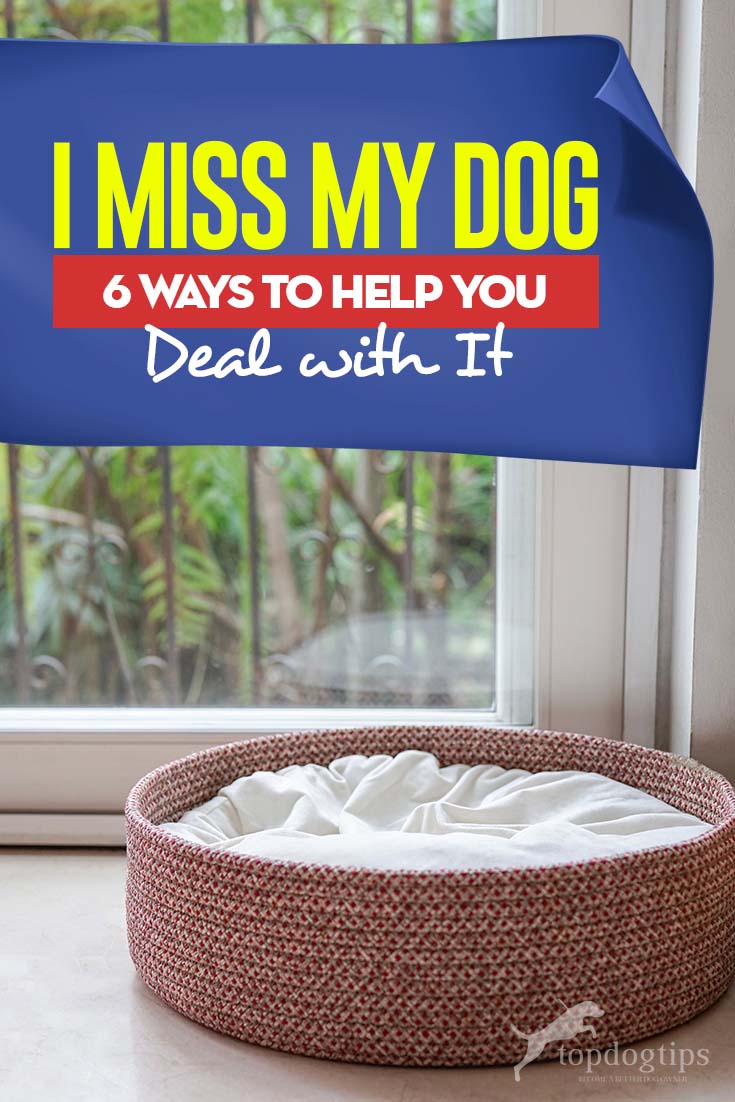Famous actor Will Rogers once said, “If there are no dogs in Heaven, then when I die I want to go where they went.” Dogs are our pets, friends and family members. Our connection with them can become so tight that we cannot imagine life without them. In fact, there have been cases where people suffered clinical heartbreaks after separation from their dogs.
Needless to say, losing a best friend for whatever reason can be extremely difficult on the human's psyche and many pet owners will go through the stage of “I miss my dog.” It's important to understand what we and other dog owners experience in these times in order to be able to deal with this.
Here are some tips on how to cope with the loss of a dog and relieve the psychological pain that you're likely going through. You will quickly notice the main theme of it all, which is “acceptance” – the key part to overcoming the pain.
ALSO READ: The Rainbow Bridge – What to Do When Your Dog Dies
1. Accept That Your Sadness Is Normal
“I cried for days. I couldn’t get any work done. And worst of all, I was too embarrassed about it to tell anyone, even my old soccer teammates who loved Delia. I spent days at work crying in private and muttering “allergies” whenever someone glanced at my puffy eyes.”
Deep feelings of sadness, anxiety, loneliness, fear or even despair are normal for the pet owner to feel, and the sooner you accept that, the easier it will become. People often find excuses for their grief over the lost dog, saying that they are surprised to feel that bad.
However, based on new studies, scientists say that dog loss is a serious matter that can result in a significant emotional distress for people.
Our brain rationalizes the situation repeating that our deceased pet was not human or a family member, and blames itself for the assumed exaggeration of the loss. Until you accept that your feel of missing a dog is normal, you cannot cope with it.
Furthermore, recent findings reviewed by Psychology Today show how the loss of a pet can be as distressful as facing the death of a spouse. Experts suggest that once you accept the fact that whatever you feel is normal and even expected, you are on a good track to heal the wounds. Bear in mind that there are no time limits or schedules when it comes to the grieving process.
2. Cherish the Memories
 Everybody’s pain is different. In the process of grieving over the lost dog, we can experience different stages. The first is usually denial. This is simply a refusal to accept that your dog is gone and you won’t see him again. Other stages can include anger, depression, guilt, etc. The last stage of grieving is always acceptance.
Everybody’s pain is different. In the process of grieving over the lost dog, we can experience different stages. The first is usually denial. This is simply a refusal to accept that your dog is gone and you won’t see him again. Other stages can include anger, depression, guilt, etc. The last stage of grieving is always acceptance.
Once you accept that your dog is gone, remembering the good times can help you deal with it. For example, remember the long walks you had, his cheerful bark waiting for you after a long day, etc.
If you have photos of you and him, you can put them in a visible place and remember when they were taken.
3. Don’t Blame Yourself
Some people can feel the blame for the death of their dog. When we lose someone, we often ask ourselves if we could’ve done more, like take him to the vet more often, be more aware of his mood, more careful about the cars in the street. This can lead to the loss of sleep and appetite, or to isolation and apathy.
Get over this part as quickly as possible by remembering all the times you cared for your dog. Think about the time you had him vaccinated, gave him medicine, put the blanket over him, took him inside because it was snowing, etc. Stick to the good memories and the times you did something beneficial for him.
4. Talk About It
 When something bad happens, people tend to be withdrawn, avoid seeing friends and family or going to social gatherings. This can be useful only for a short period of time, and after that it does more harm than good.
When something bad happens, people tend to be withdrawn, avoid seeing friends and family or going to social gatherings. This can be useful only for a short period of time, and after that it does more harm than good.
Stanford researchers emphasize that suppressed feelings or filling your head with negative thinking only leads to more serious psychological issues later in life such as depression and anxiety.
Try talking to the people who care for you, especially other dog owners. Let them know how you feel and share with them the stories about you and your pooch which come to your mind. Sometimes, even repeating the same story may help, because each time we tell it, it becomes more acceptable and digestible if it is bad, or more memorable if it is good.
Talking to a professional can also be of great help. The importance of talking to the counselors and psychologist for the process of grieving is well-known. Trained personnel can assist you in guiding your emotions and give advice on how to grieve in a healthy way.
5. Get Involved
When contemplating what happened to your dog becomes unbearable, don’t be afraid to get involved in different types of activities which may be of huge help. There are many support groups and hotlines on the Internet for grieving dog owners which can help you in the process.
Get in touch with people who are going through a similar experience. They might suggest a new technique which helped them overcome the loss of a dog. Additionally, it helps to know that you are not the only one going through the pain of missing a dog.
Try volunteering in the local vet ambulance, pet shop or dog shelter. Helping other dogs and their owners can help you with your pain by making you process it and drawing your attention to altruism. The feeling of being useful is a fast-track to a speedy recovery.
6. Find a New Friend
 It's a totally individual and personal decision if or when you decide to adopt a new dog. People who once had a dog, often will end up with a new four-legged friend but you shouldn’t feel pressure to do it.
It's a totally individual and personal decision if or when you decide to adopt a new dog. People who once had a dog, often will end up with a new four-legged friend but you shouldn’t feel pressure to do it.
While having a new dog can be mind-distracting and beneficial, it can also lead to harmful comparisons which can renew your pain. Make this decision when things cool down a bit and you can think straight.
When you are ready to welcome your new pet, accept him as a new, different friend and not as the one who should imitate the previous. Having a new pet doesn’t mean you’ve forgotten about your old dog, but that you’ve faced the loss and moved on.
Whenever we accept a new friend, be that a human or animal, our life changes. And often, it leads to new adventures.
In Summary
Losing a dog can be a devastating experience and it often feels like losing the closest member of your family. It's heartbreaking and psychologically painful for the dog owner.
To start the healing process, accept that your feelings for your dog and them not being around anymore are normal. Take your time to grieve and express your sadness. Talking to your friends, other dog owners, family members or a professional therapist will help you overcome the sudden emptiness.
Ultimately, always have in mind that welcoming a new dog into your life is a personal decision, and it means accepting the new, not replacing the old.
READ NEXT: 7 Tips To Help You Deal With the Loss of A Pet













